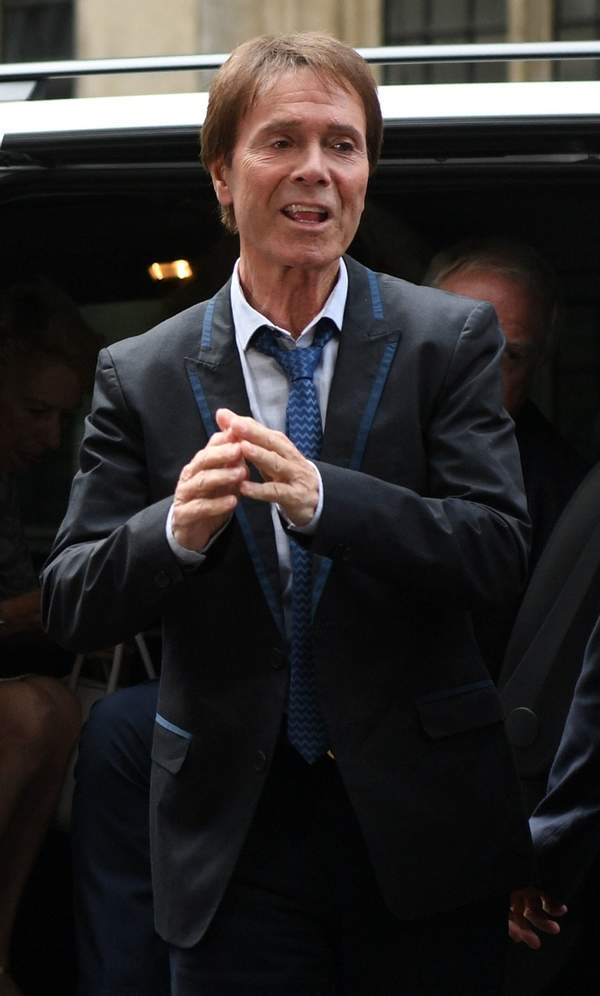By James Simons-
Sir Cliff Richard been awarded more than £200,000 in damages after winning his High Court privacy battle against the BBC over its coverage of a police search of his home.
The 77-year-old singer cried with relief as the ruling was announced. Sir Cliff Richard won his legal action against the BBC over broadcasts of a South Yorkshire Police raid on his home in Sunningdale, Berkshire, in August 2014, following a child sex assault allegation. He claimed he was left “shocked and upset” after helicopter footage of officers searching his Berkshire home was screened on the 1pm news.
South Yorkshire Police had worked in conjunction with a reporter from the BBC ahead of the raid which followed a child sex assault allegation.
Sir Richard later sued the BBC and the police force , claiming his reputation and career was damaged by the reporting. He fought back tears earlier this year as he told the civil trial he found watching the TV footage “shocking and upset” and it took a toll on his physical and mental health.
In his ruling, Mr Justice Mann said the BBC had infringed the star’s privacy rights in a “serious and sensationalist way”.
The BBC fought the claims vigorously arguing that the coverage they pursued was accurate and in good faith. The BBC insisted it had a “strong journalistic right” to report on events at Sir Cliff’s home, arguing a ruling against it would curb the media’s ability to cover police investigations. After the verdict, the corporation said it was considering an appeal. Delivering his verdict that the singer should be awarded damages for invasion of privacy, Mr Justice Mann said: “Sir Cliff had privacy rights in respect of the police investigation, and that the BBC infringed those rights without a legal justification”, he said.
“It did so in a serious way and also in a somewhat sensationalist way.
“I have rejected the BBC’s case that it was justified in reporting as it did under its rights to freedom of expression and freedom of the press.”Mr Justice Mann listened to evidence in late 2013 about a man who made an allegation to the Metropolitan Police saying he had been sexually assaulted by Sir Cliff during an event featuring evangelist Billy Graham at Sheffield United’s Bramall Lane football stadium, in 1985, when he was a child.
Speaking outside court, Sir Richard was emotional . He said it was “going to take a little while” and that he was too emotional to talk, adding: “I hope you’ll forgive me.”
His lawyer Gideon Benaim intervening said the singer never expected after 60 years in the public eye to have his “privacy and reputation tarnished in such a way”.He said “serious questions” should be asked about why the organisation tried so hard to preserve its “exclusive” story. He added the singer was not interested in personal gain and his aim was to “right a wrong”.
Sir Cliff’s spokesman Phil Hall said: “It’s been a very hard journey for him.”
In a statement, BBC director of news Fran Unsworth said: “We are sorry for the distress that Sir Cliff has been through. We understand the very serious impact that this has had on him.
“We have thought long and hard about how we covered this story. On reflection there are things we would have done differently, however the judge has ruled that the very naming of Sir Cliff was unlawful. So even had the BBC not used helicopter shots or ran the story with less prominence, the judge would still have found that the story was unlawful; despite ruling that what we broadcast about the search was accurate.
“This judgment creates new case law and represents a dramatic shift against press freedom and the long-standing ability of journalists to report on police investigations, which in some cases has led to further complainants coming forward.
“This isn’t just about reporting on individuals. It means police investigations, and searches of people’s homes, could go unreported and unscrutinised. It will make it harder to scrutinise the conduct of the police and we fear it will undermine the wider principle of the public’s right to know. It will put decision-making in the hands of the police.
“We don’t believe this is compatible with liberty and press freedoms.
“For all of these reasons, there is a significant principle at stake. That is why the BBC is looking at an appeal.”
Pic Credits: PA

